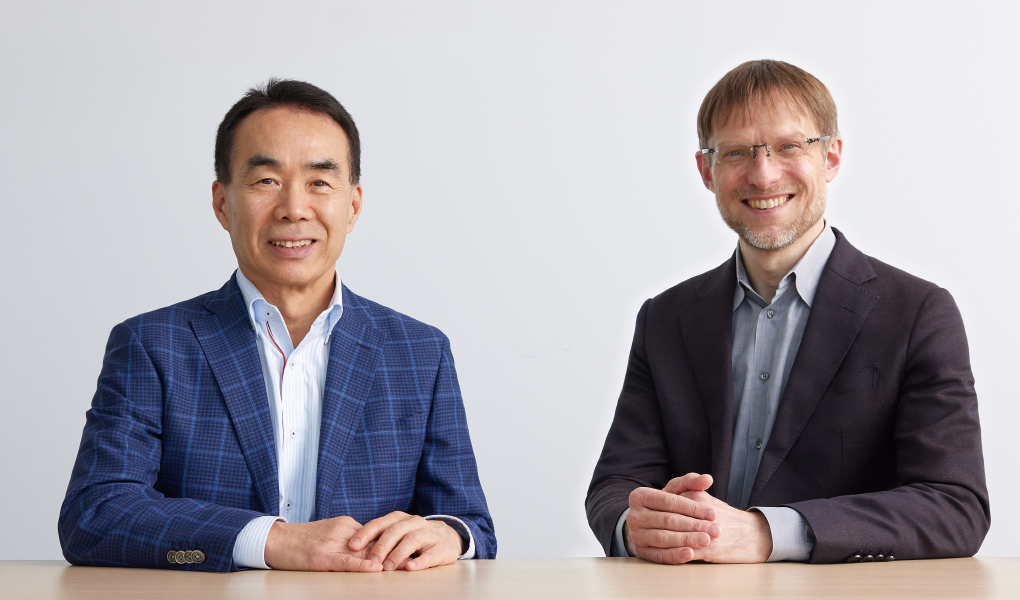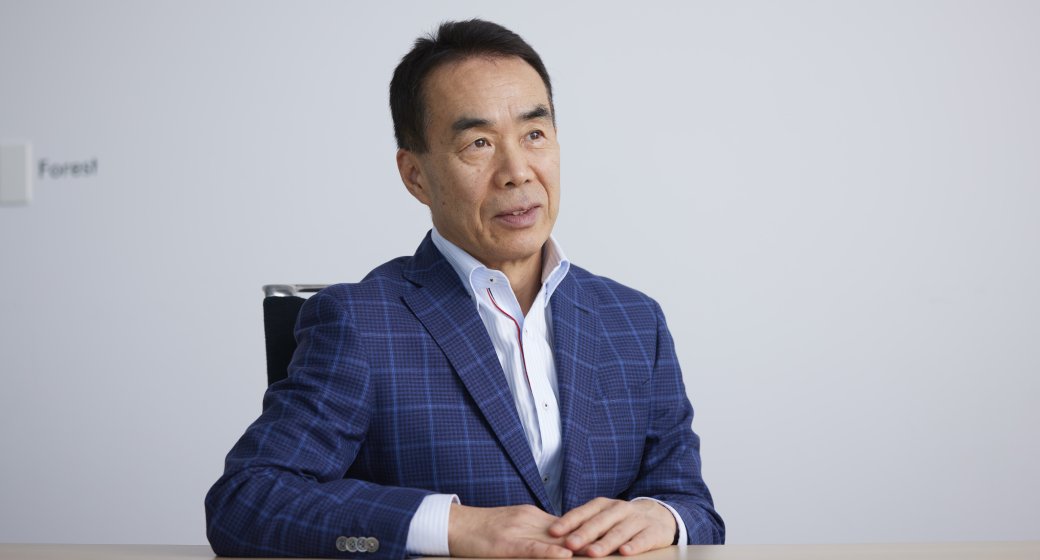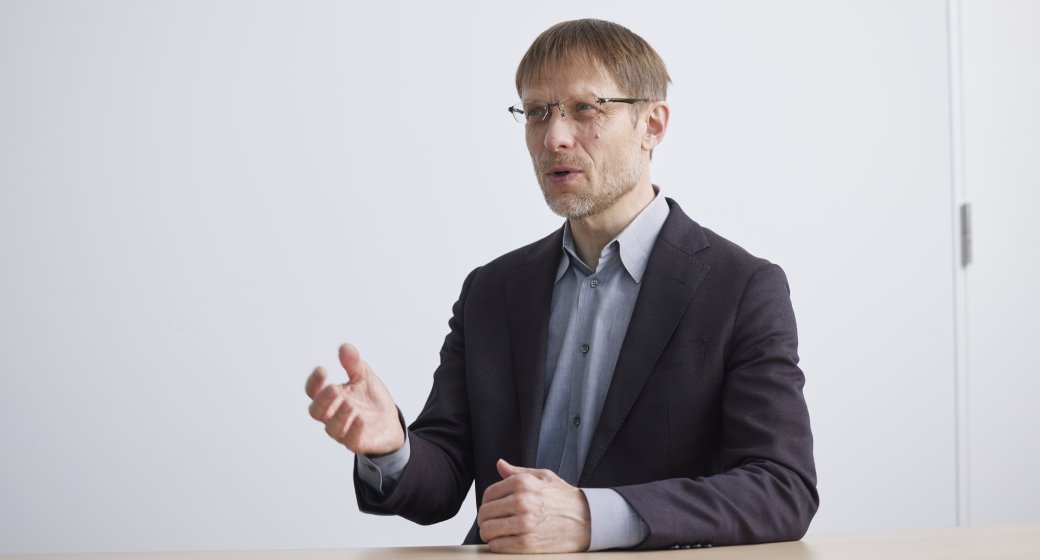Integrated Report 2025Sustainability Talks: Utilizing individual abilities to create value that resonates with the senses through innovation
Published on June 27, 2025
This page has been translated using AI.
Since returning to Japan in 1995, Peter D. Pedersen has supported Japanese companies in their sustainability management efforts, gaining extensive expertise in nurturing the next generation of leaders. President Takashima discussed organizational management strategies to enhance corporate value with him.

An entrepreneur, originally from Denmark. After attending high school in Japan, he recognized the great potential in Japan’s rich nature, history, culture, and values. He returned to Japan in 1995, and has since been involved in supporting sustainability management at various companies and organizations. Currently, he serves as the representative director of Nelis, a non-profit organization dedicated to cultivating next-generation leaders on a global scale, while also holding positions as an outside director for multiple Japanese companies.
Attempting transformation, under the banner of a company name change
TakashimaWhen I became president in 2020, the COVID-19 pandemic had begun, and our stock price and business performance were not good. Driven by a sense of crisis that the Company would have no future without change, we resolved to change our company name, as a symbol of transformation.
PedersenI heard that the name “artience” is a combination of the words “art” and “science.”
TakashimaYes, that’s right. Until now, we have positioned ourselves as a science-driven company. However, in a world where technology and AI will become the central focus, we believe it is important for us to deliberately focus more on people. The new company name embodies our commitment to providing not only “science” but also “art” — forms of value that resonate with the senses (emotional value,) such as empathy and shared emotional thrills. The concept of “art” also encompasses the liberal arts philosophy of embracing diverse perspectives, making it a fitting name for our new direction as a company.
PedersenThat’s interesting. Typically, a name doesn’t convey a company’s philosophy, but the name “artience ”itself expresses your philosophy. It’s wonderful.
Takashima“Creating value that resonates with the senses and building a future where all people can live enriched lives” is our raison d’être as a company. Being useful to society, and understanding people’s wants and needs. We are pursuing these two things. Through discussions on the theme of “emotional value” during internal roundtable talks, my perspective has changed. Before, I believed that emotional value was about “universalizing identity.” Now, I understand that it is about “wishing for people’s happiness.” In conversations with frontline employees, I heard them express that “emotional value is about the joy of seeing the products we create being used in the world.” The perspective is external. It’s about altruism, or serving the interests of others. I learned this through my discussions with employees.
PedersenDuring the World Future Society conference held in the United States in 1997, it was said that we had entered the era of the “experience economy.” Experience is really about emotional or sensory value. Companies that provide good experiences will prevail in business. In that sense, artience’s “value that resonates with the senses” is a great asset.
People-oriented management with an emphasis on individuals
PedersenI hear that the overseas ratio of your business is increasing. Overseas, the name “artience” probably comes across better than “Toyo Ink Co., Ltd.” How do your employees feel about it?
TakashimaSome employees had a particular attachment to the word “ink.” In overseas markets, particularly in Asia, “ink” remains the core of our business. On the other hand, many employees view the new name very positively. Over the past two years, we have held roundtable talks with young and mid-career employees at various locations, and one thing that surprised me was how positively the employees in India viewed the name change. While the company name at our subsidiary in India is still “Toyo Ink India,” employees have expressed a desire to change it to “artience” there as well, and they agree with the philosophy behind the change.
PedersenThinking about art and science seems to be becoming an “interface” for communication.
Takashima We have been streaming videos since January 2025, in which we convey the message that we are not a manufacturing company, but rather one that creates emotional value and joy. Then, I received an email directly from a factory employee saying that they felt uncomfortable about this.
PedersenIt’s great that you have a company culture where employees can speak directly to the president about such things.

TakashimaYes, it made me happy. In my direct response, I communicated the fact that the company name actually emphasizes manufacturing, and is forward-thinking. Thanks to increased opportunities for dialogue, we’ve noticed gradual changes.
PedersenLarge Japanese companies tend to suppress individual thinking and smooth out sharp edges in their organizational cultures. However, in the coming era, it will be essential for us to bring out that individuality while working toward our goals. I believe that organizations where people can take the initiative to move toward their goals will be the ones that survive.
Takashima Our management philosophy is “People-oriented management.” The whole exists because of its individual parts. It is absolutely unacceptable for individuals to be sacrificed for the sake of the organization. We are currently undergoing corporate reforms, but we have decided that this philosophy will never change.
PedersenCompanies need to unlock the potential of each individual and ensure that their lives are not wasted. Human capital management can easily become a formality. I believe that the most important thing is to maximize the abilities of individuals and enable them to continue taking on new challenges, thereby leveraging “people” as a form of capital.
Creating an organization where individuals are empowered
PedersenII feel that few people in Japan possess strong leadership abilities. An ideal organization is one that supports those who dare to venture into uncharted territory. Even if 70% of our efforts fail, I fear that there is no future for Japanese industry unless we take on bold challenges.
Takashima One of the core companies in our group, TOYO INK Co., Ltd., has traditionally had a strong top-down corporate culture, and is now undergoing the most significant transformation. Frontline employees are now submitting proposals. One such initiative is a new system called CX Center. By reducing staff by one-third while leveraging digital transformation (DX,) they are implementing a system to handle technical services and order processing. They are confident that this will improve customer satisfaction.
Pedersen That’s great. Empowering individuals is something that was impossible for us to do in a top-down organization. It may take five or ten years to see results, but I believe the company will undergo a dramatic transformation, so I encourage everyone to keep trying.
TakashimaAnother example is the Business Idea Contest (now known as “IPPO,”) which we launched in 2021 to support individuals who want to take on new challenges. This year marks the fourth time around, and the contest continues to evolve. The most applications have come from Toyo Ink Co., Ltd., which has experienced a tough 4–5 years due to the shrinking printing market, and is now really hungry for success. Performance has improved, and investors are expressing their surprise.
PedersenIt’s great that you’re able to turn a business contest into results, because that’s really hard to do. I think that having intrapreneurs, or entrepreneurs within the company, is a good fit for Japanese companies. It’s about maximizing freedom with a certain level of resources. It’s important for us to become an organization that can embrace diverse approaches to working and tackling new challenges.
TakashimaGenerally, the number of entries in business contests tends to decrease after a few years, but in our case it continues to increase. There are some really promising ideas. We want to increase the number of success stories, so we’re trying to create a system to support them more. When we posted a call for ideas for a certain project and said we needed people with marketing or sales experience, several employees volunteered immediately. We’re hoping to create a system where everyone supports the dreams of individuals.
Pedersen It’s a system where top-level management sets the direction, middle management provides support, and front-line employees take the lead, isn’t it?
Aiming for creative governance
Pedersen Japanese companies are great at auditing, risk management, and compliance, but I am also concerned that focusing too much on these areas may hinder innovation. Governance exists to support and back up the free exploration of opportunities, underpinned by high ethical standards. The question is whether individual leaders can ensure a culture of integrity on the front lines.
TakashimaDifferences in corporate ethics and governance are clearly reflected in attitudes toward the use of generative AI. We launched a cross-functional Generative AI Utilization Promotion Task Force in 2024, identified it as a material issue, and are exploring rules as we actively attempt new challenges. However, I have heard that some companies are restricting or prohibiting the use of AI to minimize risks, such as structural inadequacies or information leaks.
PedersenRules are meant to support, not suppress. I hope this shift continues to progress in a positive direction.
TakashimaAs part of our governance reforms, we started by reforming our Board of Directors. Do you think that the company will change as a result of this?
PedersenYes, it will. First, it is important to select the right people. I serve as an outside director for several companies. Some engage in strategic discussions, while others hold overnight retreats. At one company, I also serve as chair of the sustainability committee. When outside directors with specialist knowledge and experience come together, the discussions can be very interesting. This is creative governance.
TakashimaIt is very beneficial to have outside directors who are professionals in the areas that the Company values. When I speak with our external board members, they all express a desire to be more involved and fulfill their roles more fully.
PedersenYes, that’s how it is. External board members want to get more involved, within the limits of the time available to them.
Contributing to sustainability issues and enhancing corporate value

PedersenIn addition to its technological and financial capabilities, Japan also has a non-Western view of nature, and the sanpo-yoshi (“three-way satisfaction” or “win-win-win”) philosophy of the Omi merchants. I came back to Japan in 1995 because I believed that Japan could show the world a different path from the Western approach to solving sustainability issues. However, I believe that Japanese companies today are being swept away by the influences of neoliberalism, global financial capitalism, and shareholder capitalism, and are unable to fully realize their true potential. Your company’s “emotional value” could be the solution to this problem.
TakashimaAs president, I base my management philosophy on Eiichi Shibusawa’s The Analects and the Abacus, which states that contribution to society and pursuit of profit are not mutually exclusive. They can coexist. I believe that true shareholder capitalism is achieved only when the economic benefits for shareholders are balanced with contributions to society.
PedersenThat’s right. That’s why listed companies are forced to make very tough decisions.
TakashimaCurrently, an anti-ESG trend is emerging globally, but as a manufacturer we view climate change mitigation as our responsibility, while also recognizing the business opportunities associated with it. Pursuing both of these things is at the core of our Sustainability Vision asv2050/2030, and we have no intention of changing that.
PedersenThat’s good. In today’s world, ESG activities must be linked to business to be positively recognized by the market. Being business-oriented is, in a sense, the ultimate form of recognition. While it is important to value shareholders as stakeholders, I believe that being swayed by them is not the role of management.
A diverse organization generates diverse emotional value
TakashimaWith global operations advancing, and more than 50% of our net sales and 60% of our operating profit coming from overseas, the Human Resources Department is working to increase the global mobility of our human resources. Since over 60% of our employees are overseas national staff, we believe that seeking out new talent globally will also increase innovation and corporate value. Additionally, both our Board of Directors and Group Management Committee meetings are composed entirely of Japanese members, which we recognize as a significant issue.
PedersenGlobalization of corporate headquarters is a significant issue for many Japanese companies. Some companies have deliberately placed the core of their global human resources functions overseas. They have also hired a significant number of foreign employees at their head offices, to the point where it is noticeable.
TakashimaWith regard to our overseas offices, we hold a Global Management Forum twice a year in Japan, where top-level management from our overseas subsidiaries gather. While there are some women among our overseas executives, their numbers are not yet significant.
PedersenThe Global Management Forum is a great initiative. You should definitely continue holding it. While the number of female executives is important, the recruitment of female employees is also key. Similar to the hiring of foreign nationals, as we spoke of earlier, it is essential to purposefully recruit a significant number of female employees at once. Without such bold and symbolic initiatives, the pace of change will not increase.
TakashimaYes. We still have a low percentage of female employees, so we are strategically setting targets and working toward them.
PedersenTechnical and manufacturing fields have historically tended to have fewer women, but I feel that women are often better at empathizing with and considering things from a user’s perspective, regardless of the business they are in. Incorporating that perspective further will help artience to enhance its ability to create emotional value.
TakashimaSince we changed the company name to artience, the number of female applicants has increased. I hope that the “art and science” concept is resonating with them.
Pedersen It must be resonating. The company name symbolizes a transformation for the entire company, and it gives me hope for the future.
Takashima I am grateful for your assessments and valuable insights. Thank you very much for today.
